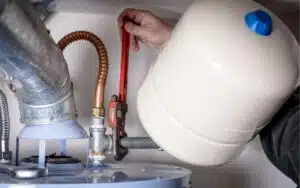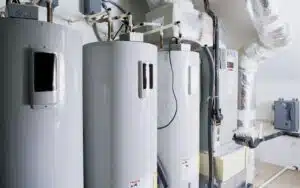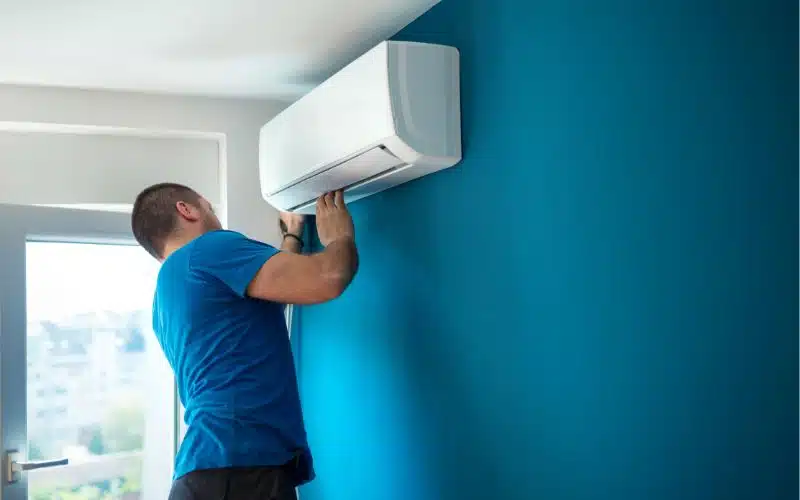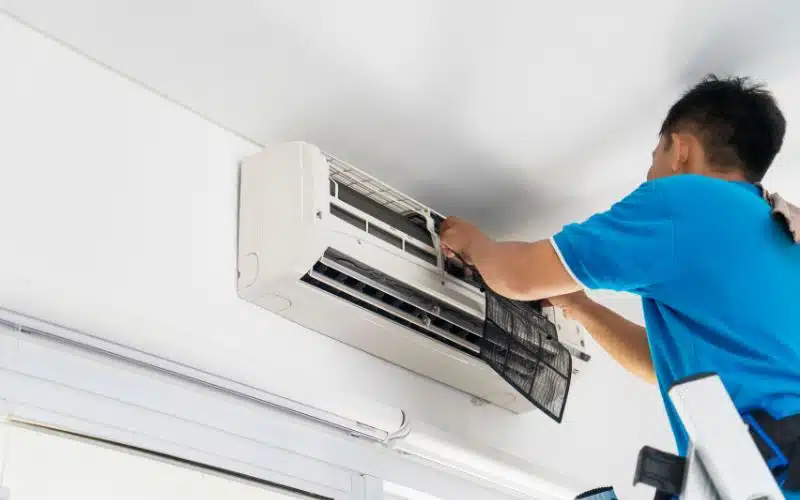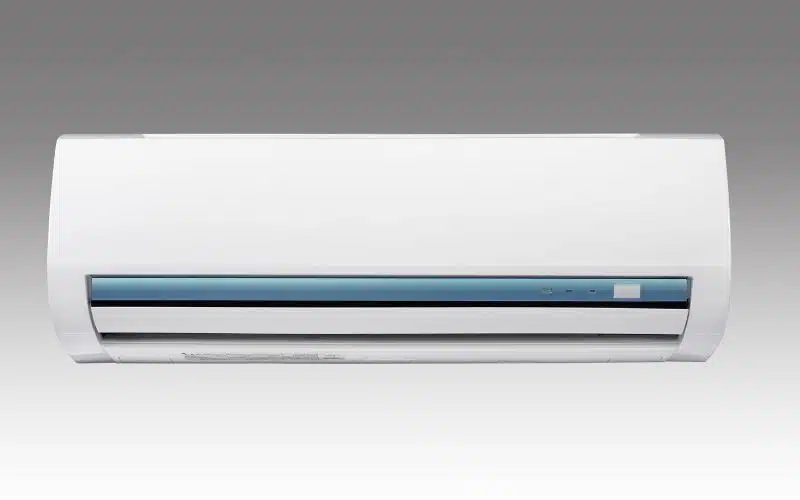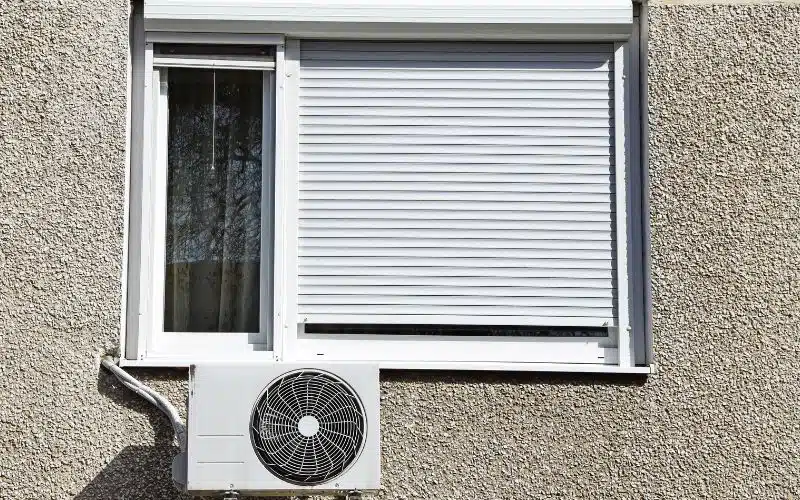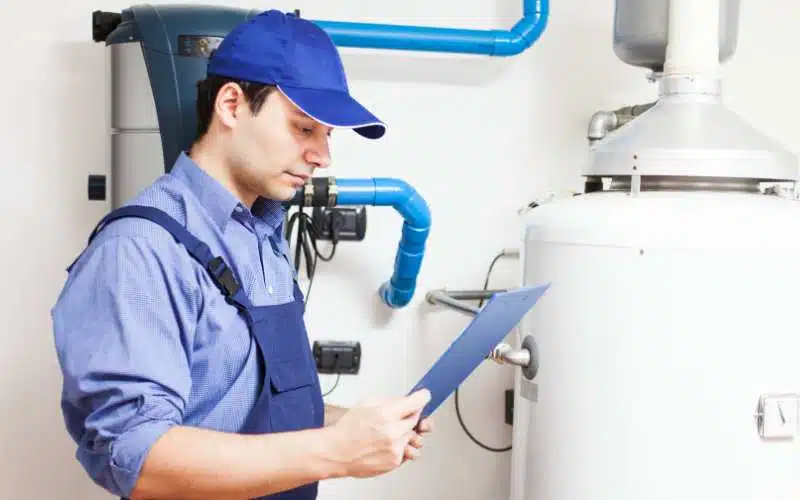AC units vary in size and play a crucial role in installing the air conditioner. Therefore, it is vital to understand where each tonnage of AC applies before installing it in your house.
For example, a 3-ton and 3.5-ton AC unit are just a little above average sizes, even though the differences are evident in the cooling capacity and SEER ratings.
A 3-ton AC unit is smaller and has a lower cooling capacity than a 3.5-ton Unit. As a result, it consumes less power than a 3.5-ton unit and covers a smaller space. However, an AC unit’s tonnage does not determine its longevity if you follow its ideal cooling size.
3-ton Vs. 3.5-ton AC
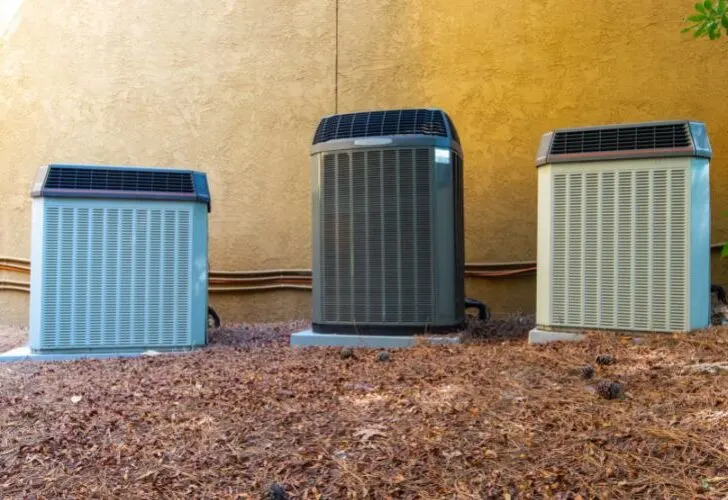
A 3-ton air conditioner is a little above the standard range for home air conditioners.
It moves heat of 36,000 British Thermal Units (BTU) per hour and operates at an average of 3,600 Watts per hour.
The 3-ton air conditioner unit can cover an average-sized house of 1,800 square feet. However, a 25A circuit breaker must function in high and low energy efficiency levels.
However, a 3.5-ton air conditioner unit is more significant than any standard residential air conditioner.
It moves heat at 42,000 British Thermal Units (BTU) per hour and operates at an average of 3,500 Watts per hour.
The 3.5-ton air conditioner unit may be too much for a small or average-sized house because it can cover more than 1,800 square feet.
However, it can’t cover above 2,100 square feet. It also uses a 25A circuit breaker like a 3-ton AC unit.
Additionally, there are many advantages that a 3-ton AC offers that 3.5-ton doesn’t, while there are some the latter offers that the former doesn’t.
Therefore, it is best to understand the situations where both air conditioner units apply and how much value and quality they give.
Here are the pros and cons that differentiate between both units.
#1. Cooling Capacity
A 3-ton air conditioner unit may be undersized to cool your house if it is beyond its cooling capacity.
It can only keep part of the house cool and leave some parts warm. It won’t be able to run through a normal on and off cycle, and it would affect the efficiency of the air conditioner.
You may need to install more than one of the 3-ton units in the house to increase the efficiency.
Meanwhile, a 3.5-ton unit would cover such an area effortlessly, and you won’t have to spend double installing more than one unit in the building.
In addition, the efficiency of the 3.5-ton unit won’t have issues with running through a normal on and off cycle. Thus, it would give you more comfort compared to a 3-ton AC unit.
#2. Cost of Installation
It is more expensive to install a 3.5-ton unit because of its size, while a 3-ton unit may be affordable.
The price of installation plus other factors like the cost of labor will be a perfect determinant to consider if you are on a budget. Your 3-ton AC unit should be perfect for a standard, medium-sized house.
#3. Energy Cost
Although installing a 3-ton air conditioner unit may be less expensive, it does not mean the cost of energy bills would be lower than that of a 3.5-ton unit.
While the 3.5-ton unit uses more power to cool and maintain it because of its size, the 3-ton unit uses a lot of energy to operate.
In addition, the 3-ton unit is smaller, and using it for a large building capacity meant for a 3.5 ton would keep it struggling to function.
Hence, the AC would run continuously without having a maintenance level where it rests. Therefore, it would keep adding to your energy bill and make it too expensive to maintain.
However, it is easier for a 3.5 ton to function at that room capacity and maintain the temperature without pushing your energy bills off the limit.
#4. Lifespan
A 3.5-ton AC unit would often short cycle because of its ability to cool a small area faster.
The 3.5-ton air conditioner’s compressor would turn on and off frequently and cause the AC to short cycle easily.
It damages the air conditioner and causes it to wear and tear. It eventually results in a shorter lifespan, and the unit stops functioning.
Although the 3.5-ton unit may have a shorter lifespan because of short cycling, the 3-ton may last longer if it works at standard capacity.
However, if the building capacity is too large for a 3-ton unit, it could also affect its lifespan.
In addition, due to the ac unit’s struggle to cool a larger area, it would keep having issues with going through a complete on and off cycle.
The struggle would cause the AC to break down frequently, and you may have to spend more money repairing it.
Also, the constant repairing and continuous struggle would cause it to wear, eventually damaging the appliance.
Therefore, it is essential to use a 3.5-ton and a 3-ton unit for their ideal cooling capacity to maintain their quality.
#5. Air Quality
A 3.5-ton AC unit would turn off for a more extended period because of its ability to short cycle.
Therefore it would be unable to remove dust, moisture, and other particles from the atmosphere during this period.
As a result, you may begin to sweat and sneeze more inside the house when the AC turns off. In contrast, a 3 unit may probably keep the air cleaner in such building size.
However, it only applies to areas that are too small for the unit. An ideal-sized building won’t give you issues.
If the building capacity is too small for the appliance, you may experience the same issues with a 3-ton AC unit.
However, the 3 units can function well in any average-sized building without affecting its quality.
3-ton Vs. 3.5-ton Air Conditioner Price Difference
A 3-ton AC unit is cheaper than a 3.5-ton unit, although the price difference is not much. The difference in prices is between $100 to $400.
A 3-ton air conditioner unit costs between $3,400 to $3,700 to purchase the AC unit alone.
At the same time, a 3.5-ton AC unit material would cost between $3,500 to $3,800.
However, installing both AC units would cost between $4,000 to $7,000, with other factors included.
Additionally, the price of your AC unit depends on several factors, and you need to put the factors into consideration before making a budget for your air conditioner. A 3-ton unit may cost more if you consider the determining factor.
The factors determining the price of AC units are;
#1. Type of System
The 3.5-ton and 3-ton AC units may vary in size and cooling capacity. However, the AC systems do not differ from each other.
The AC unit installation includes a ductless system, heat pump, package central AC systems, and ducted split systems.
The installation systems range from efficient to most efficient and vary according to your budget.
#2. SEER Rating
The SEER rating determines the efficiency of an AC unit. A unit with a higher SEER rating would run better than one with a lower rating.
An AC unit with a higher rating would also consume less power than a lower rating unit.
The price of an AC unit with a higher SEER rating would also be higher than a lower SEER rating AC unit. Since a 3-ton and a 3.5-ton unit have different ratings, it would affect both prices.
#3. System Size
A load calculation would determine the size of the AC unit your building requires. Knowing the ideal size for your house is essential so it doesn’t affect the appliance’s efficiency.
A bigger AC unit would cost more than a smaller one, although it is best to install one big AC that can cool effectively than installing one or more AC that would struggle to cool effectively.
An undersized AC unit may not cost much to install, but the cooling capacity may be too small for the space. As a result, it would increase the cost of energy bills and make you spend more.
On the other hand, a bigger AC unit with a larger cooling capacity may function irregularly and make you spend more money on repairing it constantly before it eventually breaks down.
#4. Ductwork
A new ductwork installation or replacement would increase the cost of installing any size of air conditioning unit.
The cost of ductwork varies according to the size of the cooling space and the amount of ductwork needed.
The house’s interior and accessibility of the ductwork also add to the price of installing an AC.
Hence, the installation cost of a 3-ton may be higher than a 3.5-ton AC unit if the ductwork of the former is more complex.
What is the Cooling Capacity of a 3-ton AC?
The cooling capacity of a 3-ton AC unit is 36,000 BTUs per hour. Therefore, a 3-ton AC can work effectively in any average-sized house without consuming too much energy.
The cooling capacity of the AC unit would depend on the ambient temperature and humidity level of the house.
A 3-ton AC unit could cool less than its capacity if the humidity and temperature are not high. Hence, it is essential to consider your weather and seasons.
The cooling capacity would differ according to space, and the AC unit would break down if it exceeds the maximum cooling area.
The ideal size of the cooling space for a 3-ton AC unit is;
| Type of Space | Ideal Size |
|---|---|
| Room | Between 1,500 to 1,800 square feet |
| Entire house | Between 2,000 to 2,100 square feet |
| House in a cool area | It may do up to 2,400 square feet of house |
What is the Cooling Capacity of a 3.5-ton AC?
The cooling capacity of a 3.5-ton AC unit is 42,000 BTUs per hour. The insulation and ventilation would contribute to how efficiently a 3.5-unit AC would cool.
It may not cool correctly if the roof is dark and absorbs more heat or the house is too broad.
Inadequate ductwork and dirty coil may also affect the cooling capacity of the 3.5-ton AC unit.
Although the cooling capacity of the 3.5-ton AC may seem higher than a 3-ton unit, these other factors may significantly affect it and hinder it from reaching its capacity.
The various sizes for cooling spaces in a 3.5-ton AC unit would work efficiently are;
| Type of Space | Ideal Size |
|---|---|
| Room | Between 1,800 to 2,100 square feet |
| Entire house | Average of 2,500 square feet. |
Conclusion
In conclusion, both AC units would work efficiently and last longer if you followed the rule of thumb when installing them in an intended space.
It is best to consult an expert before choosing an air conditioning unit for your house, so you don’t waste money on a less effective cooling system.
References:
- Rheem Gladiator Water Heater Service Needed Light On!
- This is How To Tell If A Two-Stage Furnace is Working!
- Does Rheem Water Heater Have A Battery? (Read This First)
- Rheem Vs Joven Water Heater (In-Depth Comparison)
- Is The Rheem Water Heater Warranty Prorated? (Explained)
- Is Rheem Water Heater Warranty Transferable?


